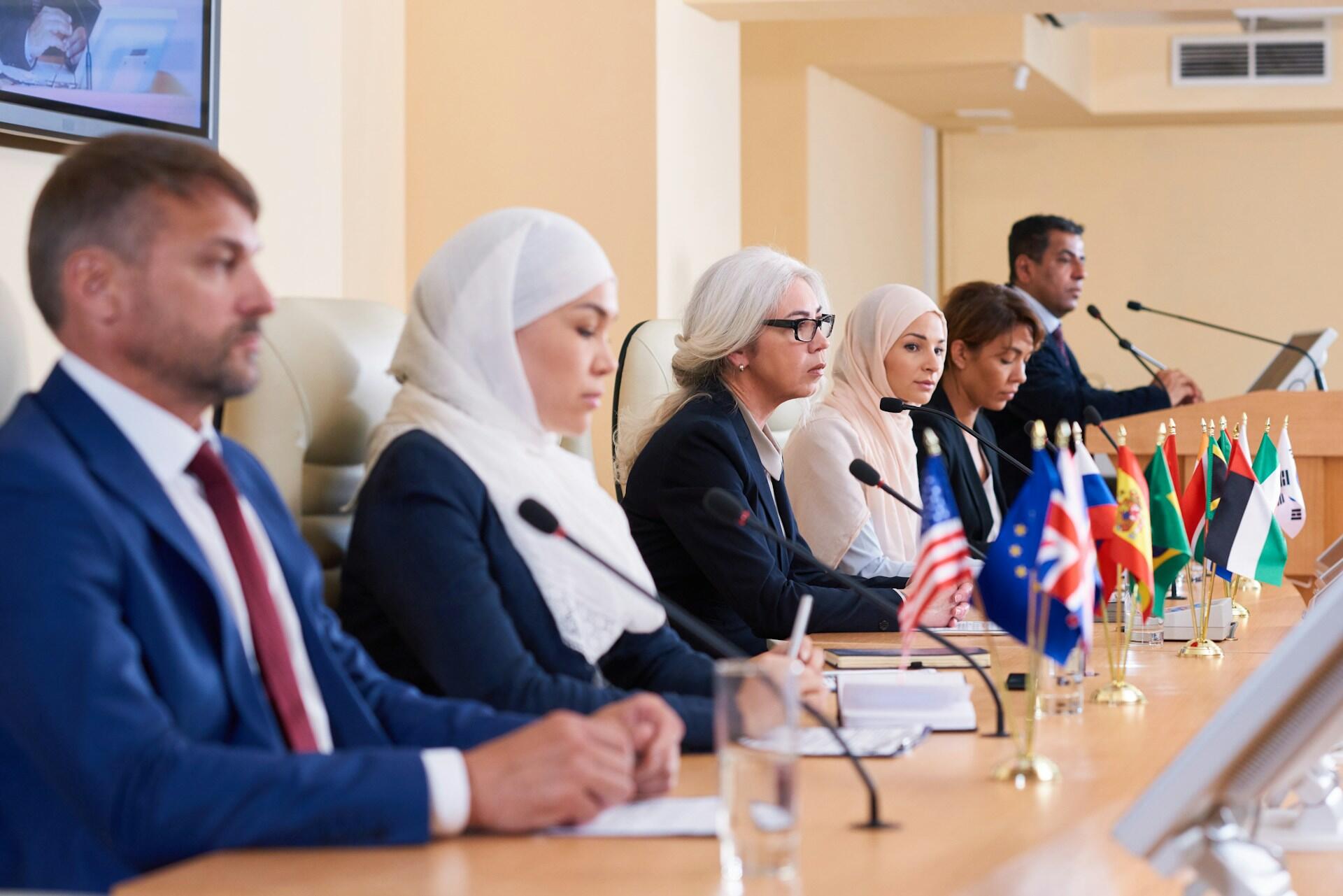Collins Dictionary defines diplomacy as the act of managing relations between the governments of different countries. That definition gives us two clues about the skills one needs to aim for a diplomat career UK. Communication skills are vital; so is knowledge about other countries. Those skills go a long way towards building a career as a diplomat.
The Pathway to Diplomatic Services Careers
- In secondary school: build communication skills, study history and geography.
- At university: major in political science, international relations, economics, or other relevant subjects.
- Build related skills: study languages, economics/finance, and work with different groups
- Undergo the application process: apply to a Civil Service Fast Stream programme.

What Does a Diplomat Do?
In all cases, diplomats represent their countries' interests, whether at home or abroad. What a diplomat does depends on their place in the diplomatic hierarchy. The diplomatic chain of command has up to seven levels of representation, depending on the size of the office.
Diplomats mostly work abroad, representing and protecting their countries' interests in their host countries. As such, they tend to have a background in international relations. However, a sizable contingent operates in the home country. They help formulate policies, assess current happenings, and advise their counterparts abroad, when needed.

Focusing on Your Diplomatic Career in the UK
The general definition for diplomacy applies in UK-specific contexts, but that explanation only goes so far. As a representative of the UK Diplomatic Service, your mission is to represent British interests abroad and at home.
Let's say you're a part of a diplomatic delegation meeting with foreign diplomats in Glasgow or London. Listening to your counterparts' presentations is, of course, vital. You must then present the UK's position on those issues and search for common ground without giving up too much ground to resolve the matter.
In the British Foreign Service, it's standard to spend your first couple of years of service in the UK. Once your training is complete, you may accept postings overseas.
Should you accept a post abroad, managing overseas British citizens' affairs will be a part of your duties. This includes renewing passports and other vital documents, and informing them of important issues about their host country that may impact them.
Careers as a Diplomat
It takes a long time (years!) to build up to high-level diplomatic positions. You might spend years as a low-level diplomat, serving in British consulates in several countries.

Often, promotions are based on a combination of factors, including job performance and years in service. Keeping up with the required training factors in. Not taking part in mandatory training could see the end of your career, while adding to your skill set is the surest way to climb the diplomatic ranks.
For instance, studying your host country's language gives your employee profile a definite boost. In fact, if you have a country you'd like a posting in, you may learn its language before you apply for service. Doing so not only raises your chances of being hired, but it also increases your likelihood of landing a desired posting.
Assessment and Development Centres evaluate candidates' management and leadership skills.
These centres challenge promotion candidates with a set of exercises, some written and others interactive. Through them, they determine candidates' knowledge growth and the likelihood that they would serve better in a higher-ranking position.
Diplomatic Services Careers
as reported on the National Careers website
The UK government pages detailing aspects of diplomatic service typically focus on, well, diplomatic services. However, like any other enterprise, diplomatic service workers need a range of services that have nothing to do with diplomacy. Those include:
- facilities maintenance
- information and communications technology
- security services
- catering services
- finance management services
Granted, these aren't careers you need a degree in politics for, but they are relevant to foreign service. That means you have a shot at working overseas even if you don't pursue a degree in political science at university. Otherwise, diplomatic services break along two lines.
Foreign service
- provide consular support for UK citizens abroad
- process UK visa applications
- provide administrative support to embassy workers
Domestic service
- monitor and analyse events overseas
- help develop policies for diplomacy towards other countries
- draft/work with official documents
In either situation, you may deal with communication matters, including addressing the press. Advising citizens and responding to their queries will also be a part of your duties.
How Long Does it Take to Be a Diplomat?
As the video above hints at, we have to make a distinction between being a diplomat and a service officer. Diplomats engage in diplomacy, while a diplomatic services officer manages things like visa issuance and administrative work.
You'll need decades to earn the diplomat label. But you can join the diplomatic services corps in just a few years.
In fact, unless you're well-connected, becoming a diplomatic services officer is the only way to climb the career ladder, ultimately to become a diplomat.
You'll discover the exact steps for how to become a UK diplomat in this article's last chapter. For now, it's enough to say that nobody can present a clear, concrete career timeline.
A lot of the time spent working your way up the career ladder revolves around building experience and learning new skills.

Your upward progress also depends on how many other people qualify for promotion who have the same skills as you. That gives you a tip on how you can improve your chances of rising in the diplomatic ranks.
As you gain experience in the diplomatic corps, don't overlook your personal development.
Learning languages is arguably one of the best and easiest ways to build your diplomat profile. You may take courses to develop your understanding of government policy and public opinion interpretation. This may, in turn, lead to a slight career change as a political analyst.

How Hard Is It to Be a Diplomat?
The word 'hard' is a relative term. Someone with a firm grasp of geopolitics, who excels at communication and oozes people skills, will not find the job hard at all. On the other hand, someone battling social anxiety would likely find it difficult to staff a consulate window for a few hours. Nobody can say how hard the foreign service will be for you.
The thing about representing your country abroad, even as a member of a non-profit organisation or NGO, is that you have to believe in your mission. As a British diplomat, that means believing in our country's policies, and doing all you can to uphold them.
Over the past couple of years, we've read/heard about diplomats resigning their posts, citing their loss of faith in their countries' policies.
Moral and ethical considerations are perhaps the most challenging aspect of diplomatic service. The hardest part of being a diplomat is defining your moral/ethical boundaries.
Granted, accepting passport renewal applications doesn't require much introspection. However, you may come to the point that you can no longer serve in good faith, as those who resigned have concluded. Abandoning your career is a tough decision to make. But sometimes, it's the right thing to do, as this former career diplomat shares.
Steps to Becoming a Diplomat
Studying political science, economics, or international relations at university is the best path to access the diplomatic corps.
During your last two years at university, you may sign up for the Fast Stream Summer Internship Programme. This internship serves as a preview of Civil Service careers for you, while signalling your interest in a foreign service career.
Volunteering is another way to signal your interest and raise your profile, especially if you volunteer with groups related to international relations. Such might include refugee assistance, language study, and cultural exchange.
From here, you have two paths forward:
Direct application
- To the Foreign Development and Commonwealth Office
- must have 5 GCSEs, grades 9 - 4
- must have specific A-Level qualifications
- pathway to policy or operational officer
Fast Stream Entry
- Economic service or diplomatic service programme
- 5-year programmes
- must have a 2:2 degree or equivalent
How to Apply to Be a Diplomat
Whether you wish to become a policy advisor as a civil servant or enter foreign service, the initial steps are clear. You must demonstrate your interest as early as possible, cultivate targeted skills, and pursue the right education.
The best time to start yourself on the diplomatic career track is while you're still in school. Beyond school, this chart lays out the steps to take to ensure your application's success.
| 👣Step | 📅When to take it | 🎯Aim |
|---|---|---|
| Volunteer | While still in secondary school. While at university. | Demonstrate your commitment to cultural awareness and people-oriented work. |
| Study a specific skill Languages, economics, ITC, ect. | While in secondary school, continuing at university. | To give yourself the broadest range of skills. To increase your chances of acceptance into development programmes. |
| Apply for internships | During your last two years as an undergraduate. | Start learning diplomatic skills and other essential skills early. |
| Option 1: apply to a Fast Stream Programme | During your last year at uni. Once you graduate. | Follow a curated mentoring programmed designed to assure your career success. |
| Option 2: apply to civil service | During your last year at uni. Once you graduate. | Broadens your field of opportunity. Expands your reach from the Diplomatic Corps to other Civil Service positions. |
Summarise with AI:















